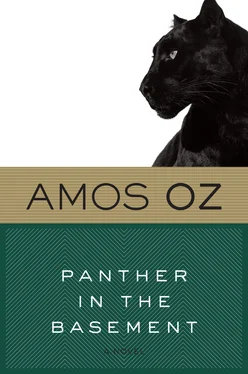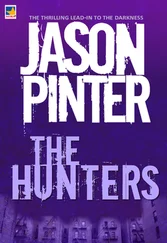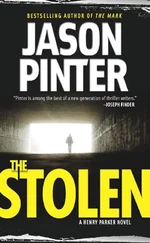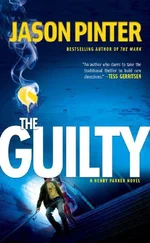I am ashamed to write this, but I shall write it nonethe less: I could easily have run away. I could have slipped out of his grasp and vanished into a yard. The policeman was clumsy, inattentive; he reminded me rather of my teacher Mr. Gihon: perplexed but well-meaning. Even the slight slope of Zephaniah Street had him panting and wheezing. (Later on I found out that he suffered from asthma.) Not only could I have escaped, but, if I had really been a panther in the basement, it would have been simple to snatch his pistol, which instead of hanging in its rightful place, on his hip, had slipped around his belt to his bottom, where it swayed and slapped the sergeant lightly with every step he took, like a door that is not properly closed. It was my clear duty to grab the gun and make a dash for it. Or to snatch it, point it at him, straight between his eyes (I think he was also nearsighted), and shout in English, "Hands up!" or, better still, "Don't move!" (Gary Cooper, Clark Gable, Humphrey Bogart, any of them would have easily got the better, single-handed, of fifty such cotton-wool enemies.) But instead of overpowering him and gaining a precious gun for our nation, I confess that I suddenly felt a little sorry that the way home was not a little longer. And at the same time I felt that it was a disgrace to feel like that and that I ought to feel ashamed. And I really did feel ashamed.
The sergeant said in his spongey accent:
"In the book of the Prophet Samuel it is written 'And the lad was only a lad.' Pray fear no evil. I am a stranger that loveth Israel."
I weighed his words. I decided that it was my duty to tell him the simple, honest truth, in my name and in the name of the nation. This is what I said (in English):
"Don't angry on me, please, sir. We are enimies until you give back our land."
What if he arrested me for speaking these bold words? Never mind, I thought. They won't scare me with their prisons and their scaffolds and their gallows. I ran over in my mind the rules we had learned from Ben Hur Tykocinski in the general HQ meeting: four ways of withstanding interrogation under torture.
In the dark I could feel Sergeant Dunlop's smile on my face, like the slobbering tongue of a clumsy, good-natured dog:
"Soon may all the dwellers in Jerusalem have tranquillity. Peace be within her walls, and prosperity within her palaces. In English speech, young man, we say enemies, not enimies. Is it thy desire that we should continue to see each other's face and learn together each one the other's tongue? And what is thy name, young man?"
In a flash, coolly and clearheadedly, I took stock of the situation from every angle. I had learned from Father that in a time of testing an intelligent man should locate all the data at his disposal within an overall picture, distinguish rationally between what is possible and what is necessary, and always weigh coolly the various options open to him; only then should he choose the lesser evil. (Father often used the expressions "definitely," "indubitably," "rationally," and also "genuinely.") In that instant I remembered the night when the clandestine immigrants were being landed. How the heroes of the Underground carried the survivors on their backs from the beached ship. How a whole British brigade surrounded them on the beach. How the heroes of the Underground destroyed their identity papers and mingled with the immigrants so that the British would not be able to tell who was a resident and who should be expelled as an illegal immigrant. How the British cooped them all up with coils of barbed wire and interrogated them one by one, name, address, occupation, and to all the interrogators' questions they all, immigrants and resistance fighters alike, gave the same proud reply: I am a Jew from the Land of Israel.
At that moment I, too, made up my mind not to tell them my name. Even if they tortured me. Nevertheless, out of tactical considerations, I chose at that juncture to pretend I had not understood the question. The sergeant repeated gently:
"If it is thy wish, let us see each other from time to time at the Orient Palace Café. That is where I spend my spare time: I shall learn Hebrew from thy mouth and recompense thee with lessons in English. The name is Mr. Stephen Dunlop. And thou, my young man?"
"I'm Proffy." And I added boldly: "A Jew from the Land of Israel."
What did I care? Proffy was only a nickname. I think it was Lightning Bolt with Olivia de Havilland and Humphrey Bogart. Humphrey Bogart was captured by the enemy. Wounded, unshaven, with his clothes torn, and a thin trickle of blood trailing from the corner of his mouth, he confronted his interrogators with a faint smile that was polite yet mocking. His cool manner expressed a subtle contempt that his captors did not and could not grasp.
Sergeant Dunlop may not have understood why I said "a Jew from the Land of Israel" instead of giving him my name. But he did not protest. His soft hand moved for a moment from my back to the scruff of my neck, gave me a couple of light pats, and settled again on my shoulder. My father only rarely put his hand on my shoulder. His purpose in doing so was to say: Think again, weigh it rationally, yes indeed, and kindly change your mind. Whereas Sergeant Dunlop's hand was saying to me, more or less, that on a dark night like this it was better for two people to be together, even if they were enemies.
Father used to say about the British: "Those arrogant swashbucklers who behave as if they own the world." My mother once said: "They're nothing but young men who are full of beer and homesickness. Hungry for a woman and a holiday." (I knew and I didn't know what "hungry for a woman" meant. I didn't see that it was any reason to forgive them. And definitely not a reason to forgive women. On the contrary.)
Under the streetlamp on the corner of Zephaniah Street and Amos Street we stopped to let the policeman draw breath. He stood fanning his sweaty face with his cap. All of a sudden he put the cap on my head, chuckled, and put it back on his own head. For a moment he looked like a rubber doll that had been inflated. He looked nothing like a swashbuckler. And yet I did not forget that I mustn't not think of him as a swashbuckler.
He said:
"I was somewhat short of breath."
I seized the opportunity at once to repay him for correcting my English earlier. I said:
"In Hebrew we don't say I was short of breath, sir. We say my breath was short."
Removing his hand from my shoulder, he pulled out a checkered handkerchief and wiped the sweat off his forehead. It was the perfect moment for me to run away. Or to snatch the gun. Why did I stand there like a dummy, in the empty night, on the corner of Zephaniah and Amos streets, waiting for him, as though he were an absentminded uncle that I'd been told to accompany in case he forgot where he was going? Why did I have an urge at that moment, when the sergeant was "somewhat short of breath," to run and get him a glass of water? If the sign of treachery is a sour taste or a sensation of having your teeth set on edge, like when you chew lemon peel or soap, or when chalk squeaks on the blackboard, then at that moment I may already have been a bit of a traitor. Although I can't deny that there was also a kind of secret enjoyment. Now that I am writing this story, more than forty-five years later, and the Hebrew State exists and has conquered its enemies over and over again, I still have an urge to skip over that moment.
On the other hand, I look back on it fondly.
I have already written both here and in other places that everything has at least two sides (except a shadow). I remember with amazement that in that strange moment there was deep darkness all around us and a little island of faint light trembling beneath the policeman's flashlight, and there was a frightening emptiness, and a lot of restless shadows. But Sergeant Dunlop and I were not a shadow. And my not running away was not a shadow but a not-running-away. And a not-snatching-the-gun. At that instant a decision formed itself, as though a bell had rung inside me:
Читать дальше












